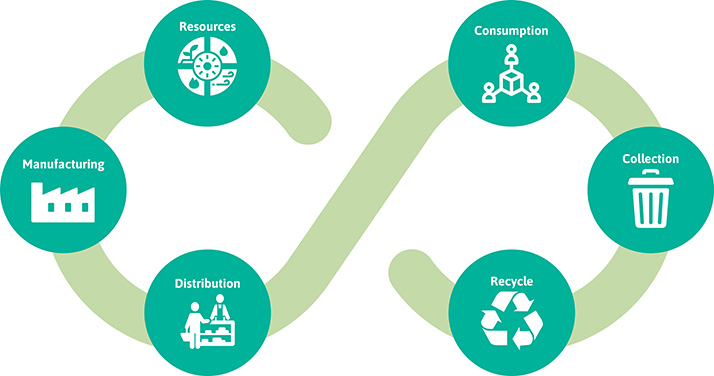FAQs
Does zero plastic really mean zero?
At Loopify, zero plastic does mean zero. We list products on our website only after we understand the complete manufacturing process from vendors and test product samples ourselves. From bottle caps to bubble wraps, we ensure that no item includes plastic.
If you do receive a product with any form of plastic, it’s on us! You can write to us at support@loopify.world.
You can refer to our returns policy for any further queries.
Doesn’t most plastic that we use get recycled?
A lot of the plastic that we use does get recycled, but not every piece of plastic is easy to recycle.
- Only about 9% of plastic waste tends to get recycled, while most gets accumulated in natural environments or in landfills.
- In natural environments like soil, water and bodies of animals, small pieces of plastic called microplastics collect during the decomposition of plastic, which means that every single piece of plastic that humans have created is still present on earth.
- While the recyclability of plastic is undeniable, it is impacting our physical and environmental health in ways that might not be visible to us.
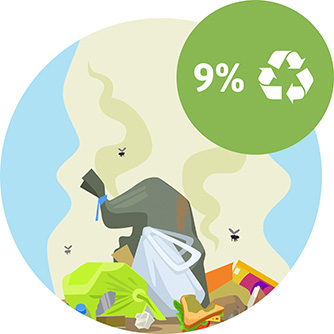
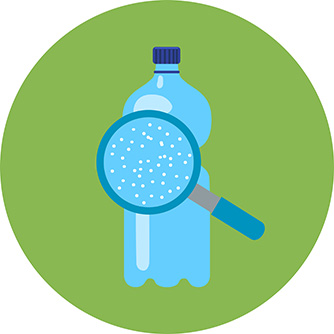
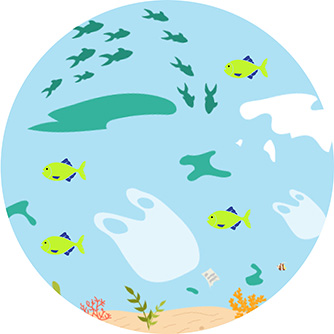
While recycling plastic is great, eliminating it entirely is much better!
Plastic is everywhere & impossible to completely remove from everyday life. How will one person buying a zero plastic product change anything?
One person making the switch can make a huge difference! Through our Loopify Sustainability Index, we show you exactly how buying just one product can make a difference to reduction in plastic pollution and carbon emissions.
Amazon is also reducing the use of plastic in its packaging. Why should I buy from Loopify instead?
While several major players in the e-commerce business have pledged to reduce plastic, here are three reasons you should buy from Loopify instead:
- We aim to eliminate plastic completely and try to ensure there are no loopholes in our system. We aren’t just talking about reducing, we are addressing the complete removal of plastic through our platform altogether.
- We verify our vendors and sample each product. On other e-commerce platforms, what you see is not what you always get. With us, you can be guaranteed that you’re getting items straight from a verified vendor, and you’re also supporting local businesses!
- We are transparent about how sustainable a product is. You will know what materials are used to make it and how to dispose the waste generated from it. Check out our product pages for specific information on this, or if you have more questions, reach out to support@loopify.world.
What if I find plastic in my order?
We really hope this doesn’t happen, but in the rare case that it does, you can write to us or place a return request, and we will refund the entire order amount.
I want to reduce my plastic usage but where do I start?
The best way to get started on a no-plastic journey is to start small, and you’ve started small by just reading this message. Taking small actions in the no-plastic journey positively impacts the planet in more ways than you can imagine.
The three easy switches that you can make in your daily routine are:
- Switch to a glass or a copper bottle
- Use a cloth bag instead of a plastic bag
- Use a wooden comb instead of one with plastic bristles
What is ‘green washing’?
Greenwashing is when a company presents its actions as environmentally beneficial while hiding damaging actions that negatively impact the environment. For instance, presenting a glass bottle as sustainable is misleading if the bottle has a plastic cap.
Watch out for greenwashing tactics like misleading labels that certify a product as organic or 100% green without evidence or imagery that is environmental-centric but does not link to sustainability.
How do you calculate the sustainability impact of your products?
We have created a Loopify Sustainability Index, which calculates the impact of every item you purchase from us. We analyse the product from "source to delivery" on two critical parameters that drives sustainability – the manufacturing and materials. We have further considered additional sustainability parameters such as biodegradability, use of upcycled materials, veganism, etc. These are chosen based on well researched global guidelines.
My housing society collects all my plastic garbage separately. Doesn’t that get recycled?
When plastic is collected from your housing society, all of it is not recyclable.
- Not all plastic is easy to recycle, so some plastic is dumped into landfills and the natural environment. This decomposes and creates microplastics that accumulate into soil, water and natural resources.
- People don’t tend to wash food out of plastic containers, which makes the items non-recyclable and re-distributed to landfill waste.
- Waste collection and treatment is not completely efficient and transparent due to mixing of plastic wastes with regular recyclable waste.
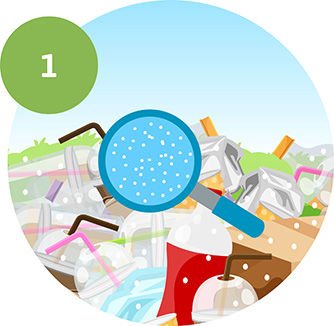
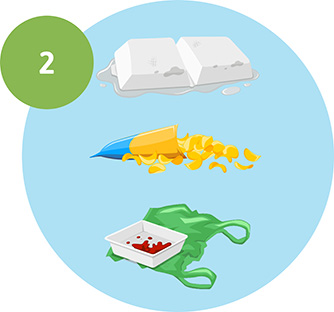
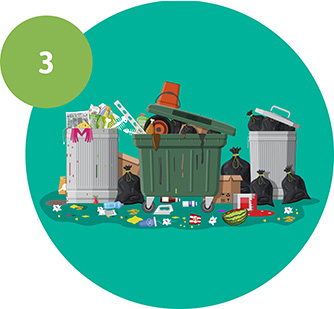
Aren’t zero plastic sustainable alternatives more expensive?
Zero plastic sustainable alternatives come at a variety of price ranges, and certain products are more expensive. However, these products are often directly sourced from local vendors, who directly put in the effort during the manufacturing and distribution process to oversee for quality control.
From a broader perspective, costs are not just about the prices, but about the hidden cost to your health and well-being, and the costs to the environment around you. For example:
- Personal care products that are cheaper but mass-produced are often tested on animals or contain chemicals whose long-term impacts are unclear.
- Plastics used to package mass-produced products are not sent back to nature without the generation of micro-plastics or through increased carbon emissions.
Aren’t zero plastic alternatives less durable?
The durability of a product depends entirely on how you use it. Some products might have a shorter shelf life due to the use of natural materials, but with the right care, you can make them last as long as possible. Plastic might last very long for you, but it also lasts long on the planet, eventually adding to pollution.
I really believe in the zero-plastic cause, but my family doesn’t. what can I do?
One person making the switch to zero plastic can make a difference. No one lives in isolation and going plastic free for yourself first is the best step to take. Just a simple swap reduces your carbon footprint more than you know.
To encourage your loved ones to join the zero-plastic movement, you can gift them plastic free alternatives to see how easy it is to go sustainable!
How do I reduce plastic consumption at my workplace/office?
Our general rule of thumb for actionable change around plastic consumption is to start small in your immediate circle of influence. For junior employees, the simple swaps you make – like a copper bottle or a cloth lunch bag – make all the difference.
If you can implement larger changes within the company, here are some of the small swaps you can make:
- Use bamboo tissue paper and toilet paper in the washrooms.
- Ensure that waste segregation is explained carefully to employees – especially that takeaway containers need to be washed before they are thrown!
- Recycled paper and growable pencils are some of the many stationery swaps to be more sustainable.
- If you need to send gifts to employees and clients – we have plenty of corporate gifting options. Check out our gift studio here or contact us at support@loopify.world for more information.
The key is to make the no-plastic journey a part of your company culture. The impact of each organisation taking those actionable steps is larger than you think!
Isn’t cutting trees as bad as using plastic?
Yes, cutting trees is extremely harmful to the environment and increases carbon emissions. Growing back the trees that are cut takes an incredibly long time. However, here at Loopify, we try our best to substitute freshly cut wood with upcycled, fallen and waste wood in our products. We also use bamboo as one of our materials, since it grows back extremely quickly, and a lot of the paper we sell is made from cow dung, plantable paper and similar materials.
What do I do with all the waste generated from the things I buy?
At Loopify, all the waste generated is either reusable or biodegradable, which means that it can be returned to the earth without any harmful impact. Our product listing pages show you how to sustainably dispose any waste material generated from the product.
The product I received had plastic tape in the packaging. Since you say that you’re completely plastic-free, why do you use them?
While we have attempted to use paper tapes to pack our products, they don’t tend to stick that well. This can cause the tampering of the package and cause issues during transportation and delivery. A switch to great-quality paper tape is currently a work in progress for us, and we’re trying to come up with a completely plastic-free and sustainable solution for this dilemma!
I would like to volunteer to be a part of this journey. What are the ways in which I can help?
If you want to get more involved with us and the broader sustainability journey, there are plenty of ways to do that.
- Give us a shout out on social media to spread the word about your sustainability journey.
- Gift your loved ones a sustainable hamper for a special occasion.
- Make just one swap in your daily routine to build to a sustainable lifestyle!
I am comfortable using my brands for personal care. Why should I make the switch?
If finding the perfect brands for you took some time, it might still take some experimentation with sustainable products. There are a large variety of options you can choose from, and we list products for different types of hair and skin!
The great thing about natural products is that you can directly identify the ingredients that might be harsh on your skin. Regardless, it is best to do a test patch on your skin to see if the product works for you. You can also consult your dermatologist beforehand to ensure you don’t have any allergies or adverse reactions.
Why the name Loopify?
Loopify is about closing the loop. Based on the concept of the circular economy, we believe that everything that we take from the earth needs to go back to where it came from. The products we source optimise the use of materials to maintain the natural harmony, encouraging mindful consumption and a plastic-free lifestyle.
